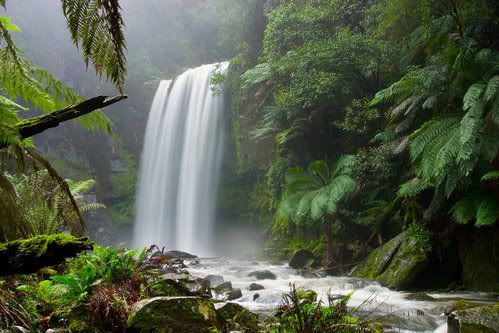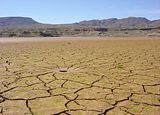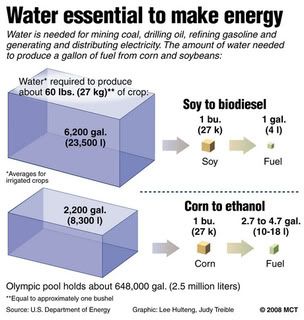(10 am – promoted by ek hornbeck)
Water is essential for life.
 |
But, America and much of the rest of the world is running short of clean, freshwater.
 The future is drying up in much of the United States reported The New York Times last October. “Water tables all over the United States have been dropping, sometimes drastically, from overuse. In the Denver area, some cities that use only groundwater will almost certainly exhaust their accessible supplies by 2050.” Drought hit hard the Southeast this fall and before the winter rains came, the residents of Atlanta were less than 90-days away from exhausting the city’s freshwater supply.
The future is drying up in much of the United States reported The New York Times last October. “Water tables all over the United States have been dropping, sometimes drastically, from overuse. In the Denver area, some cities that use only groundwater will almost certainly exhaust their accessible supplies by 2050.” Drought hit hard the Southeast this fall and before the winter rains came, the residents of Atlanta were less than 90-days away from exhausting the city’s freshwater supply.
Adding to the drought-caused strain on America’s water supply, is the country’s increasing energy demands. McClatchy Newspapers reports that America’s Energy and water demands are on collision course. “It takes a lot of water to produce energy. It takes a lot of energy to provide water. The two are inextricably linked, and claims on each are rising.”
These claims are not just of the type people living in the Pacific Northwest are used to hearing of where hydroelectric dams in the Pacific Northwest are causing the extinction of salmon, but water is also needed for nearly all energy production.
As the McClatchy story explains
“The water supply is as critical as oil,” said Charles Groat, a geologist and expert on the problem at the University of Texas in Austin.
In return, “water use requires a tremendous amount of energy,” said Peter Gleick, the president of the Pacific Institute for Studies in Development, Environment and Security in Oakland, Calif.
As the United States tries to lower its dependence on foreign oil by producing more energy from domestic sources such as ethanol, however, it’s running low on fresh water.
Water is needed for mining coal, drilling for oil, refining gasoline, generating and distributing electricity, and disposing of waste, Gleick said.
“The largest use of water is to cool power plants,” he said at a panel of experts on “The Global Nexus of Energy and Water” in Boston last month.
Water shortages can force nuclear power plants to shutdown. For example:
Nuclear plants are subject to restrictions on the temperature of the discharged coolant, because hot water quickly evaporates and can also kill fish or plants or otherwise disrupt the environment. Those restrictions, coupled with the drought, led to the one-day shutdown August 16 of a TVA reactor at Browns Ferry in Alabama.
The water was low on the Tennessee River and had become warmer than usual under the hot sun. By the time it had been pumped through the Browns Ferry plant, it had become hotter still — too hot to release back into the river, according to the TVA. So the utility shut down a reactor.
 Biodiesel and ethanol are increasing the demands on America’s freshwater resources and that will exacerbate the country’s water shortages. The McClatchy story quotes Michael Webber, a mechanical engineer and researcher at the University of Texas in Austin as explaining “driving one mile on ethanol consumes 600 gallons of water to irrigate the corn from which it’s made… Even plug-in hybrids, which are touted as the most efficient way to power electric cars, need to withdraw 10 gallons of water for every mile traveled”.
Biodiesel and ethanol are increasing the demands on America’s freshwater resources and that will exacerbate the country’s water shortages. The McClatchy story quotes Michael Webber, a mechanical engineer and researcher at the University of Texas in Austin as explaining “driving one mile on ethanol consumes 600 gallons of water to irrigate the corn from which it’s made… Even plug-in hybrids, which are touted as the most efficient way to power electric cars, need to withdraw 10 gallons of water for every mile traveled”.
Even if the United States had enough water to make all the biodiesel and ethanol it needed, there still is a pollution problem to solve with these fuels’ production. Earlier this week, The New York Times reported that Alabama’s first biodiesel plant was polluting the Black Warrior River near Tuscaloosa with an “oily sheen” that “resembled Italian salad dressing”. This pollution is called a byproduct of a ‘clean’ fuel.
 The day before, the Associated Press published the results of their probe that found drugs in the drinking water of 24 major metropolitan areas in the United States. “A vast array of pharmaceuticals – including antibiotics, anti-convulsants, mood stabilizers and sex hormones – have been found in the drinking water supplies of at least 41 million Americans.” Not only are pharmaceuticals tainting our water, but the pesticides and herbicides like Atrazine our agriculture uses to grow corn and soybeans, which we use to make ethanol and biodiesel, are also polluting our limited suppy of freshwater.
The day before, the Associated Press published the results of their probe that found drugs in the drinking water of 24 major metropolitan areas in the United States. “A vast array of pharmaceuticals – including antibiotics, anti-convulsants, mood stabilizers and sex hormones – have been found in the drinking water supplies of at least 41 million Americans.” Not only are pharmaceuticals tainting our water, but the pesticides and herbicides like Atrazine our agriculture uses to grow corn and soybeans, which we use to make ethanol and biodiesel, are also polluting our limited suppy of freshwater.
 The McClatchy article explains “vast amounts of energy are needed to pump, transport, treat and distribute water.” It’s a vicious cycle, lots of energy is needed to provide water and lots of water is needed to produce energy. On top of that, the heating of water is a “greedy consumer of energy”. The United States is already a huge consumer of energy. “America currently uses one-quarter of the world’s oil supply, the most of any country in the world.” In addition, “coal is used to generate more than half of the electricity in the U.S.” According to the National Geographic, “Nearly 90 percent of the world’s energy consumption is through fossil fuel, which produces carbon dioxide (CO2) when burned.”
The McClatchy article explains “vast amounts of energy are needed to pump, transport, treat and distribute water.” It’s a vicious cycle, lots of energy is needed to provide water and lots of water is needed to produce energy. On top of that, the heating of water is a “greedy consumer of energy”. The United States is already a huge consumer of energy. “America currently uses one-quarter of the world’s oil supply, the most of any country in the world.” In addition, “coal is used to generate more than half of the electricity in the U.S.” According to the National Geographic, “Nearly 90 percent of the world’s energy consumption is through fossil fuel, which produces carbon dioxide (CO2) when burned.”
 America is constrained by limited water and energy sources. Today, as the United States occupies oil-rich Iraq, getting clean water to American troops is a challenge. For example, KBR, the private military contractor, supplied American bases in Iraq with polluted hygiene and laundry water that made U.S. troops sick. But the war for Iraq was not fought for the waters of the Tigris and Euphrates, but Iraq’s oil. According to the Council of Foreign Relations and others, “In 2001 Iraq’s proven oil reserves were estimated to be around 115 billion barrels, making them the world’s third largest after Saudi Arabia’s and Canada’s.”
America is constrained by limited water and energy sources. Today, as the United States occupies oil-rich Iraq, getting clean water to American troops is a challenge. For example, KBR, the private military contractor, supplied American bases in Iraq with polluted hygiene and laundry water that made U.S. troops sick. But the war for Iraq was not fought for the waters of the Tigris and Euphrates, but Iraq’s oil. According to the Council of Foreign Relations and others, “In 2001 Iraq’s proven oil reserves were estimated to be around 115 billion barrels, making them the world’s third largest after Saudi Arabia’s and Canada’s.”
The largest surface body of freshwater is the Great Lakes shared between the United States and Canada. Environment Canada states “Canada has 7% of the world’s renewable supply of freshwater and 20% of the world’s total freshwater resources (including waters captured in glaciers and the polar ice caps).” According to the Atlas of Canada, just the Northwest Territories and Nunavut alone, “contains 9.2% of the world’s total freshwater”.
 Canada is “a freshwater-rich country“. Each year, “Canadian rivers discharge close to 9% of the world’s renewable water supply, while Canada has less than 1% of the world’s population.” Being rich with oil and water makes Canada well-positioned for the challenges of energy and water in the 21st century. But, sitting atop of all that oil and freshwater could be why some Canadians are concerned that the U.S. and Canada signed an agreement that allows troops to cross over the U.S.-Canadian border in case of “an emergency”.
Canada is “a freshwater-rich country“. Each year, “Canadian rivers discharge close to 9% of the world’s renewable water supply, while Canada has less than 1% of the world’s population.” Being rich with oil and water makes Canada well-positioned for the challenges of energy and water in the 21st century. But, sitting atop of all that oil and freshwater could be why some Canadians are concerned that the U.S. and Canada signed an agreement that allows troops to cross over the U.S.-Canadian border in case of “an emergency”.
Already water shortages contribute to the causation of wars in Africa. Last June, The Guardian reported that a United Nations report warned that the Darfur conflict heralds era of wars triggered by climate change and that “with rainfall down by up to 30% over 40 years and the Sahara advancing by well over a mile every year, tensions between farmers and herders over disappearing pasture and evaporating water holes threaten to reignite the half-century war between north and south Sudan, held at bay by a precarious 2005 peace accord.”
 |
In November, The Observer reported that Climate wars threaten billions of people and more than “100 countries face political chaos and mass migration in global warming catastrophe”. In the Americas, Peru gets most of its freshwater “from glacier meltwater. But by 2015 nearly all Peru’s glaciers will have been removed by global warming and its 27 million people will nearly all lack fresh water.” And “In Africa, rivers such as the Niger and Monu are key freshwater resources passing through many nations. As droughts worsen and more water is extracted from them conflicts will be inevitable.”
Just this past week, The Guardian reported that the European Union was told to prepare for flood of climate change migrants. So, if freshwater shortages happen in South America, then I believe the United States could see climate change migrants heading north to its border shared with Mexico.
I think oil was the most valuable resource of the 20th century. The Bush administration lied the nation into war to secure the last century’s treasure. While oil is still essential to America’s economy, this century’s future wars seem destined to be fought over freshwater. The Republicans’ solution appears to be to privatize water. For example last March, the Environmental Protection Agency hosted a conference to promote privatization of water. If freshwater, essential to life, is becoming increasingly scarce and valuable, then the Republican solution is to make sure someone will make a profit.
In October 2006, Prensa Latina, Cuba’s state-run news agency, reported of George W. Bush’s alleged Paraguay “land grab”. They reported that Bush purchased nearly 98,840 acres of land near Chaco, in northern Paraguay. The Guardian noted that “some have speculated that he might be trying to wrestle control of the Guarani Aquifer, one of the largest underground water reserves, from the Paraguayans.” Nearby the acreage is Mariscal Estigarribia, an airport and an alleged U.S. military base used in 2005 and 2006.
 The nexus between energy and water can be as simple to see as the challenge of supplying clean water to soldiers in Iraq or as complex as the relationship of the energy-water-energy production/supply relationship explained in the McClatchy article. The pressures on energy and water and food continue to grow.
The nexus between energy and water can be as simple to see as the challenge of supplying clean water to soldiers in Iraq or as complex as the relationship of the energy-water-energy production/supply relationship explained in the McClatchy article. The pressures on energy and water and food continue to grow.
So, I think it comes to this: the nations of the world, not just the United States, must acknowledge the connection between energy, food, and freshwater and then manage the growing demands on these finite resources intelligently to prevent famine and wars.
That’s good, but unlikely, on an international level, but on an individual level I think we need to make changes too. In the McClatchy story, Peter Gleick observed that “Running a hot water faucet for five minutes is the equivalent of burning a 60-watt light bulb for 14 hours… Maybe the best way to save energy is to save hot water.” I think he’s right. We need to reduce our energy dependence. We need to become energy and water conservatives.

7 comments
Skip to comment form
Author
at eenrblog.
Guess who show up there recently?
Neil Bush.. the younger brother — with Sun Myung Moon.
http://ap.google.com/article/A…
Ya gotta love the nazis. They keep it together.
the problem with nuclear power plants and cooling is often mentioned, but it goes wider than that
http://www.dailykos.com/commen…